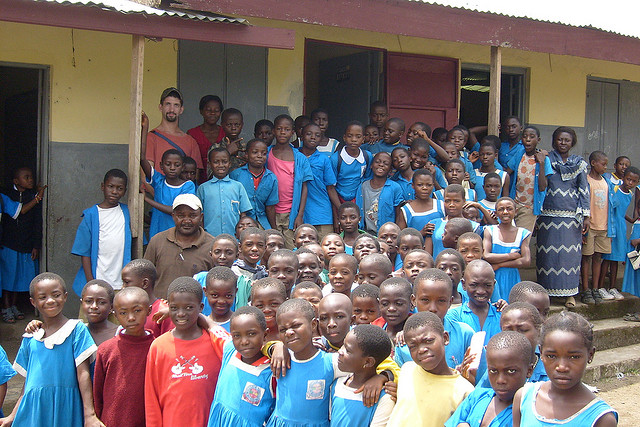Teachers’ approaches to language classroom assessment in Cameroon primary schools
DOI:
https://doi.org/10.31273/eirj.v1i1.77Abstract
Assessment has a huge impact on ESL primary pupils, in part, because on the curriculum English is both a subject and also a language of learning all the other subjects. For children still acquiring L1 it is daunting sometimes to be expected to understand concepts in L2. It may be difficult then to gather information to make an impartial judgement with regards to a pupil’s language level. This study is a preliminary inquiry that attempts to find out teachers’ approaches to classroom assessment in Cameroon primary schools. Using a qualitative open-ended question the researcher finds out three main categories of assessment approaches used by teachers. From the categories extrapolations on possible assumptions that guide teachers’ choices of assessment procedures are described and suggested for future study.
Keywords
Classroom assessment approach, Cameroon, scheme of work, ESL/EFL, Young Learners
Downloads
References
Photo - A Government Practicing School in Buea, Cameroon. Image courtesy of Trees for the Future - flikr treesftf
Black, P. and Wiliam, D. (1998), ‘Assessment and Classroom Learning’. Assessment in Education, 5 (1), pp.7- 75.
Black, P., Harrison, C. Lee, Marshall, B. and Wiliam, D. (eds) (2002), Working Inside the Black Box: Assessment for learning in the classroom, Department of Education and Professional Studies: King’s College London.
Black, P., Harrison, C., Lee, C., Marshall, B., and William, D. (2003). Assessment for Learning: Putting it into Practice, Maidenhead: Open University Press.
Bobda, A. S. (2004), ‘Linguistic apartheid: English language policy in Africa’ English Today, 77, 20/1, pp.19-26.
Cohen, L., Manion, L., and Morrison, K. (2011), Research Methods in Education. 7th Edition. Abingdon: Routledge
Davidson, C. and Leung, C. 2009, Current issues in English language teacher-based assessment, TESOL Quarterly, 43 (3), pp.393-415
Denzin, N.K. and Lincoln, Y.S. (eds) (2011), The Sage Handbook Of Qualitative Research, 4th ed. London: Sage Publication International.
Gonzales, R., and Fuggan, C.G. (2012), Exploring the conceptual and psychometric properties of classroom assessment, The International Journal of Educational and Psychological Assessment, 9 (2), pp.45-60
Harris, L., and Brown, G.T.L. (2008), New Zealand teachers’ conceptions of the purpose of assessment: Phenomenographic analyses of teachers’ thinking, Paper presented to the Australian Association for Research in Education (AARE) Annual Conference, Brisbane, Australia
Jane, S.M. (2012), Primary teachers’ conceptions of classroom assessment: a qualitative study, International Journal for Cross-disciplinary Subjects in Education (IJCDSE), Vol. 3 (2), pp.699-706.
Kouega, J-P. (2002), ‘Uses of English in Southern British Cameroon.’ English World-wide, 23 (1), pp.93-113.
Lambert, D. and Lines, D. (2000), Understanding Assessment: Purposes, Perceptions, Practice, Key Issues in Teaching and Learning Series, London and New York:Routledge-Falmer.
Ministry of National Education (2000), National Syllabuses for English-speaking Primary Schools in Cameroon, Yaounde: L’imprimerie Saint John
O’Sullivan, M. C. (2004), The reconceptualisation of learner-centred approaches: a Namibian case study, International Journal of Educational Development, 24 (6), pp.585-602
Pryor, J. and Lubisi, C. (2002), Reconceptualising educational assessment in South Africa —testing times for teachers, International Journal of Educational Development, 22 (6), pp.673–686
Rea-Dickins, P. (2001), Mirror, mirror on the wall: Identifying Processes of Classroom Assessment, Language Testing, 18 (4), pp.429- 46
Rea-Dickins, P. (2008), Classroom-based language assessment, in E. Shohamy and N. Hornberger (eds). Encyclopedia of Language and Education, Volume 7: Language Testing and Assessment, New York, NY: Springer
Stoynoff, S. (2012), Looking backward and forward at classroom-based language assessment, ELT Journal, Volume 66 (4), pp.523-532
Torrance, H. and Pryor, J. (1998), Investigating Formative Assessment: Teaching, Learning and Assessment in the Classroom, Buckingham: Open University Press.

Published
Issue
Section
License
Authors who publish with this journal agree to the following terms:
Authors retain copyright and grant the journal right of first publication with the work simultaneously licensed under a Creative Commons Attribution License (CC-BY), which permits use and redistribution of the work provided that the original author and source are credited, a link to the license is included, and an indication of changes which were made. Third-party users may not apply legal terms or technological measures to the published article which legally restrict others from doing anything the license permits.
If accepted for publication authors’ work will be made open access and distributed under a Creative Commons Attribution (CC-BY) license unless previously agreed with Exchanges’ Editor-in-Chief prior to submission.
Authors are able to enter into separate, additional contractual arrangements for the non-exclusive distribution of the journal's published version of the work (e.g., post it to an institutional repository or publish it in a book), with an acknowledgement of its initial publication in this journal.
Authors are permitted and encouraged to post their work online (e.g., in institutional repositories or on their website) prior to and during the submission process, as it can lead to productive exchanges, as well as earlier and greater citation of published work. (see: The Effect of Open Access)
